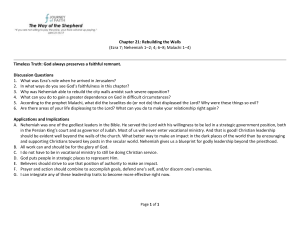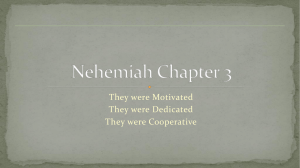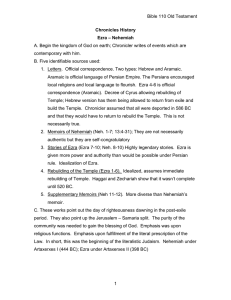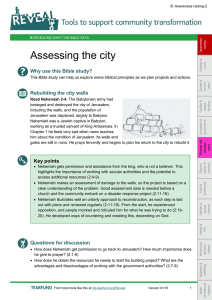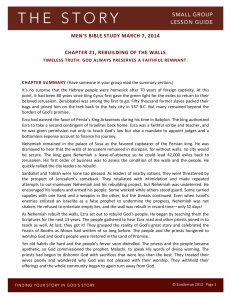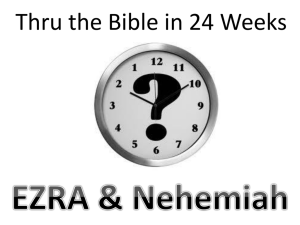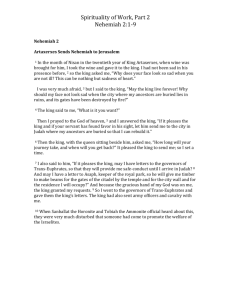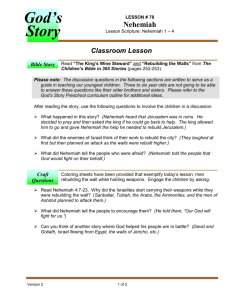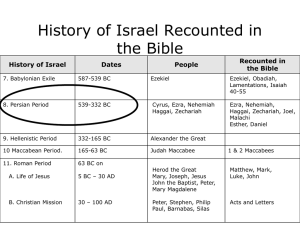Rebuilding Jerusalem: Exile & Restoration Lesson
advertisement
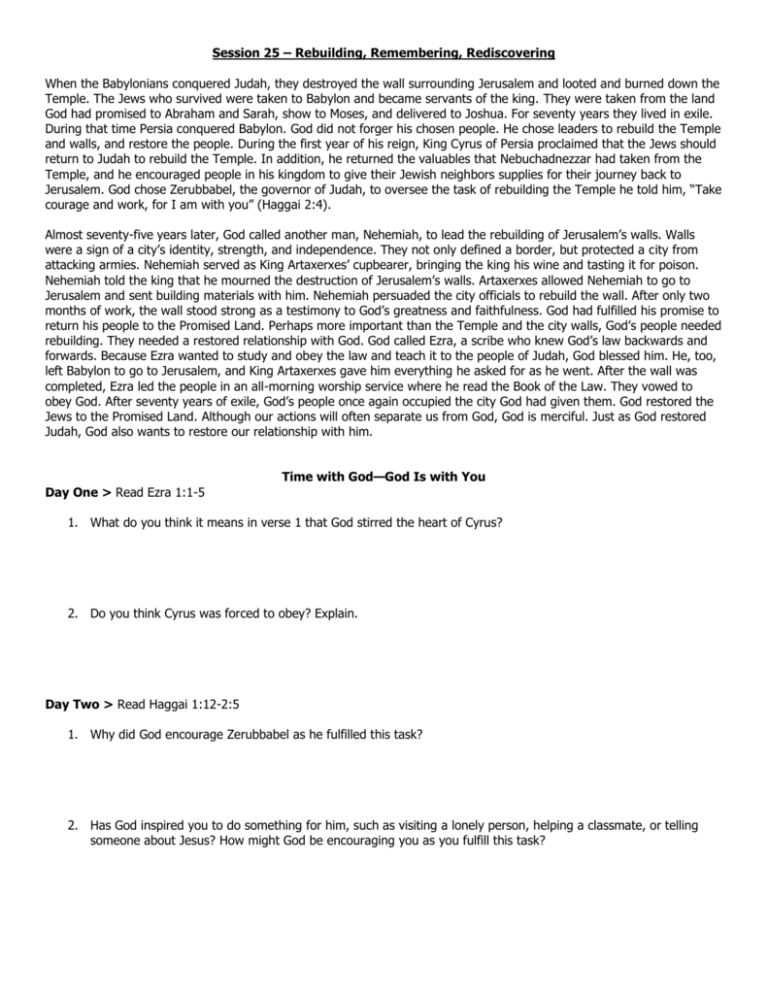
Session 25 – Rebuilding, Remembering, Rediscovering When the Babylonians conquered Judah, they destroyed the wall surrounding Jerusalem and looted and burned down the Temple. The Jews who survived were taken to Babylon and became servants of the king. They were taken from the land God had promised to Abraham and Sarah, show to Moses, and delivered to Joshua. For seventy years they lived in exile. During that time Persia conquered Babylon. God did not forger his chosen people. He chose leaders to rebuild the Temple and walls, and restore the people. During the first year of his reign, King Cyrus of Persia proclaimed that the Jews should return to Judah to rebuild the Temple. In addition, he returned the valuables that Nebuchadnezzar had taken from the Temple, and he encouraged people in his kingdom to give their Jewish neighbors supplies for their journey back to Jerusalem. God chose Zerubbabel, the governor of Judah, to oversee the task of rebuilding the Temple he told him, “Take courage and work, for I am with you” (Haggai 2:4). Almost seventy-five years later, God called another man, Nehemiah, to lead the rebuilding of Jerusalem’s walls. Walls were a sign of a city’s identity, strength, and independence. They not only defined a border, but protected a city from attacking armies. Nehemiah served as King Artaxerxes’ cupbearer, bringing the king his wine and tasting it for poison. Nehemiah told the king that he mourned the destruction of Jerusalem’s walls. Artaxerxes allowed Nehemiah to go to Jerusalem and sent building materials with him. Nehemiah persuaded the city officials to rebuild the wall. After only two months of work, the wall stood strong as a testimony to God’s greatness and faithfulness. God had fulfilled his promise to return his people to the Promised Land. Perhaps more important than the Temple and the city walls, God’s people needed rebuilding. They needed a restored relationship with God. God called Ezra, a scribe who knew God’s law backwards and forwards. Because Ezra wanted to study and obey the law and teach it to the people of Judah, God blessed him. He, too, left Babylon to go to Jerusalem, and King Artaxerxes gave him everything he asked for as he went. After the wall was completed, Ezra led the people in an all-morning worship service where he read the Book of the Law. They vowed to obey God. After seventy years of exile, God’s people once again occupied the city God had given them. God restored the Jews to the Promised Land. Although our actions will often separate us from God, God is merciful. Just as God restored Judah, God also wants to restore our relationship with him. Time with God—God Is with You Day One > Read Ezra 1:1-5 1. What do you think it means in verse 1 that God stirred the heart of Cyrus? 2. Do you think Cyrus was forced to obey? Explain. Day Two > Read Haggai 1:12-2:5 1. Why did God encourage Zerubbabel as he fulfilled this task? 2. Has God inspired you to do something for him, such as visiting a lonely person, helping a classmate, or telling someone about Jesus? How might God be encouraging you as you fulfill this task? Day Three > Read Nehemiah1:1-11 1. Who was Nehemiah concerned about? How do you know? 2. Do you have a special concern for a certain person or group of people? How could God help you reach out to that person or group? (Ask God for that help right now!) Day Four > Read Nehemiah 2:1-6, 11-18, 6:15-16 1. How did God answer Nehemiah’s prayer? How did Nehemiah respond? 2. Have you ever experienced God answering a prayer? If so, what did God do for you? Day Five > Read Ezra 7:1, 6-10 1. Why was God’s hand on Ezra? 2. How might God bless you if you dedicate yourself to knowing and sharing his word? What steps can you take toward doing these things? Day Six > Read Nehemiah 8:1-3 1. Why do you think the people were willing to stand all morning to listen to Ezra read? 2. How important is God’s word in your life?
